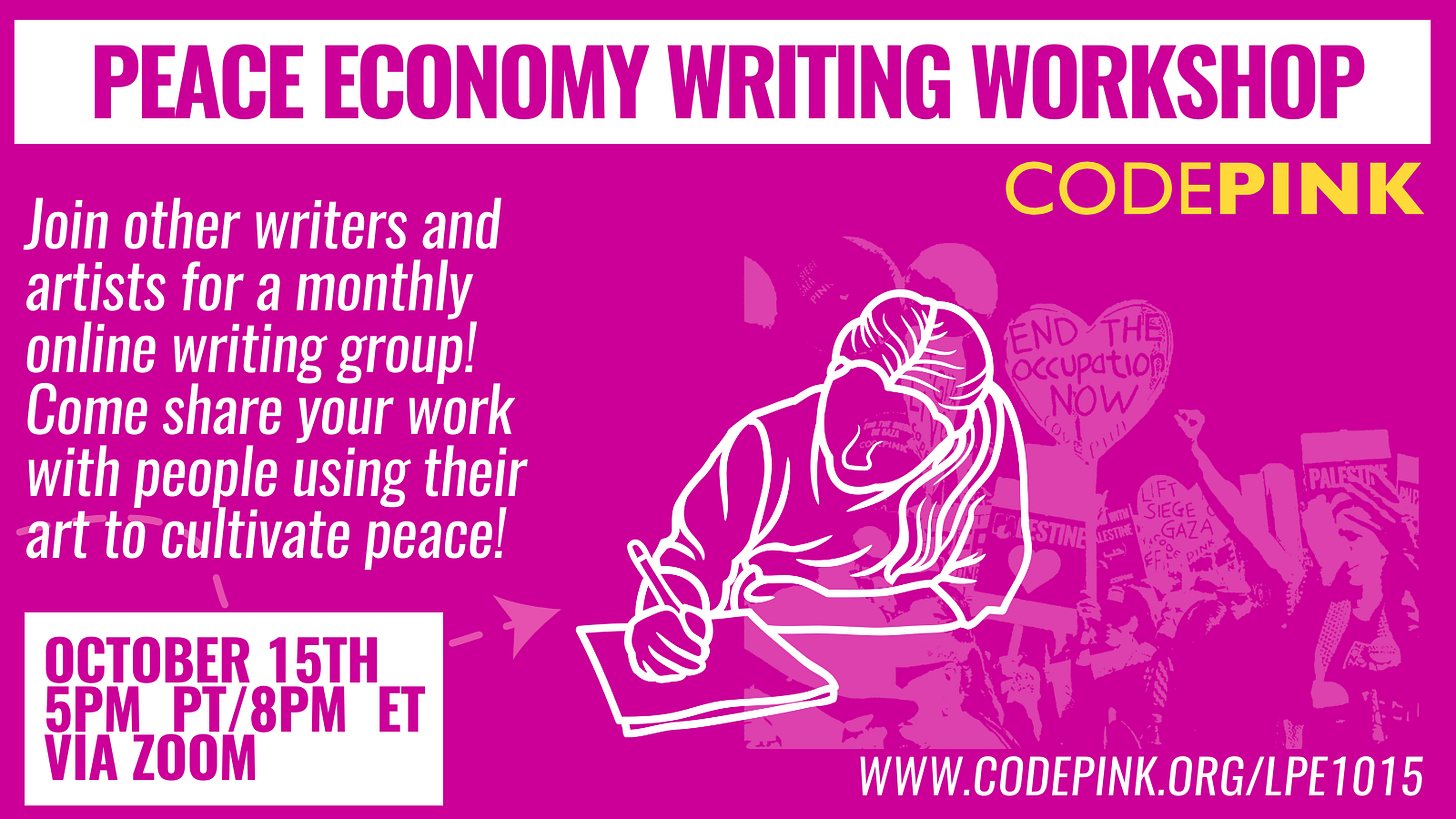Rooting Into the Peace Economy As Resistance
Emily Franko
CODEPINK has learned a lot throughout its years of anti-war organizing, including this: we’re not going to end war until we end the war economy. War serves the war economy–the extractive, destructive, oppressive system that is killing us, our communities, and the planet. Along with being in the streets and scratching at the halls of power, we must also be cultivating our local peace economies–the giving, sharing, caring, thriving, relational, resilient systems without which none of us would be alive.
The local peace economy can take many forms–co-ops, mutual aid efforts, community gardens, clothing swaps, collaborative art and media projects, community grief-tending, neighbor-led safety efforts and emergency responses, and much more. What threads the local peace economy together is the recognition of what really matters–love, peace, expression, community, and relationship.
The violence that we’re witnessing in Palestine, in Lebanon, in the U.S. against black and brown bodies, against people calling for a ceasefire, is the war economy being itself. We must continue to expose the system’s violence, and we must also create a new world–one that centers care for all life. This is the work of cultivating our local peace economies.
What does this work look like in practice? Below are some resources we shared after our last Local Peace Economy Community Call. Each is a pathway into the process of growing your local peace economy. If you have any questions about these resources, please reach out to peaceeconomy@codepink.org.
Touching Into Grief
We explored the topic of grief during our last Local Peace Economy Community Call. As you take back your life from the war economy, grief will arise–not just for what’s happening around us in the world but also for the ways we are being used by the war economy, for what the war economy has taken from us, and even for what we must give up to pivot away from the war economy. Grief is an entryway into the Cycle of (Re)connection–a process through which we come back home to ourselves, our communities, and the earth.
This grief must be tended to. If we allow it, our grief can become a teacher and can lead us toward the more beautiful future we want to live in. If you want to deepen your reflection about grief, you can find additional prompts beginning on page 100 of The Local Peace Economy Workbook.
You can also find other resources and practices to support you as you touch into your grief in our Cycle of (Re)connection library. If you're not sure where to start, we recommend:
Loss Runs Like a River Through My Life by Malkia Devich-Cyril (article)
Francis Weller on Grief (video)
Grief and Loss Workbook by the Indigenous Death Doula Collective (workbook)
Grief Release Walk with Krista Nelson (practice)
The Artist's Grief Deck (virtual card deck)
Grief can feel so heavy, and at the same time, it is also another way love takes shape. As we tend to our grief, we’re holding these words from Francis Weller:
"Grief and love are sisters, woven together from the beginning. Their kinship reminds us that there is no love that does not contain loss and no loss that is not a reminder of the love we carry for what we once held close." -Francis Weller, The Wild Edge of Sorrow: Rituals of Renewal and the Sacred Work of Grief
You can watch the recording of the Local Peace Economy Community Call here.
October 1st: Local Peace Economy Learning Hour: Co-ops & the Path to Peace
Join us for our first Local Peace Economy Learning Hour on Tuesday, October 1st. This monthly webinar will be a space to learn about specific ways the peace economy takes shape in communities. We'll be learning from people immersed in the peace economy ecosystem. Our first conversation will be all about co-ops. We're very excited to welcome Kate "Sassy" Sassoon, who has deep roots in both anti-war and co-op organizing, into this conversation! Hope to see you there!
October 15th: Peace Economy Writing Workshop
Calling all writers and artists! Join us for our first Peace Economy Writing Workshop on Tuesday, October 15th. Bring your poems, short stories, songs, etc. to a supportive group of people using their art to cultivate peace in their communities. We can't wait to create with you!
A Course on the Imaginal: Cultivating the Visionary Self
If you want to deepen into your peace economy learning with others beyond our bi-weekly calls, we recommend an upcoming offering from our friend Alixa García: A Course on the Imaginal: Cultivating the Visionary Self. Explore your relationship with grief, creativity, and the earth as you "awaken the imaginal within" in community with people creating a more beautiful future!
Other Local Peace Economy Resources
Download The Local Peace Economy Workbook (free digital version)
Local Peace Economy Wiki
Want to connect with others growing their local peace economy? Join our next Local Peace Economy Community Call on October 9th! During these calls, explore what we’re learning from our own lives and learn from the wisdom of the collective. We’d love to have you - RSVP here!
Emily Franko is the Local Peace Economy Coordinator at CODEPINK.
Emily’s past work in nonprofits and philanthropy deepened her commitment to dismantling systems of domination, within herself and in collective, and creating conditions where people can get what they need. She aims to cultivate cultures of belonging wherever she is and is excited to be doing work that supports people in creating those cultures in their own communities as CODEPINK’s Local Peace Economy Coordinator. Emily holds a Master’s in Leadership for Sustainability from the University of Vermont and a Bachelor’s in Sociology from Boston College.






